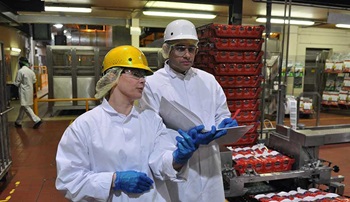Where to Begin with Developing Your Food Safety Culture
By LeAnn Chuboff, Vice President, SQFI Technical Affairs

It's my pleasure to have spent all of my professional career in the food safety field. One of the great perks are the splendidly smart and nice colleagues and dedicated professionals and companies I encounter in our work at SQF.
One such I admire and have enjoyed working with is Roger Roeth, Chief Technical Officer, at EAGLE Certification Group. The management team at EAGLE have been very supportive of the SQFI work and since 2004, have provided first, second and third-party auditing services.
Roger has over 28 years of experience in all aspects of quality assurance, compliance, food safety and food processing manufacturing. He is a certified trainer for ISO 9001 and FSSC 22000, and a trainer for the SQF Auditor course. He has conducted more than 200 GFSI food safety audits and developed the food safety programs for EAGLE. Roger holds a B.S. from The Ohio State University in Agriculture.
I recently provided Roger some questions on how he recommends where to begin with developing a food safety culture.
Where do you advise companies to begin when they want to develop a food safety centric culture?
Our team at EAGLE thinks about a healthy food safety culture as an equation.
Food Safety = Cultural Science + Social Science + Food Science
Food safety culture is one of the new requirements identified in the new GFSI Benchmarking document and it will be coming in a GFSI food safety standard that you are certified to in the near future. The GFSI Technical Working Group defined food safety culture as “Shared values, beliefs and norms that affect mind-set and behavior toward food safety in, across and throughout an organization.
Culture has been a part of our society since the beginning of time with ethnic culture, national and community cultures and even sports team culture so it is nothing new, however, applying it to food safety may be new. The GFSI Technical Working Group included many key aspects for a strong food safety culture, however, it has to start with the development of core values, beliefs, and ethos.
How do you suggest a company weave their corporate values into their food safety management system?
Values are formal as they are written down, but the underlying norms and behaviors that in many cases are associated with values are unwritten and sometimes unspoken thus they are more informal. Values are shared with new members of the company and operationalized in groups through norms and behaviors where ethos is the characteristic spirit of culture manifested in its beliefs and aspirations.
A key question is “What core values are important to your company?”
You want your company’s values to be an automatic response amongst your employees. For example, washing hands is a natural action (or should be) that should occur when touching a non-food surface or after going to the restroom. Similarly, a company’s core values transcend all aspects of the business and impacts the food safety culture. Ideally you want to engage the company’s core values whenever a decision is made.
A good example of this is about David Theno from Jack in The Box as he carried in his briefcase a photo of Lauren Rudolph who died at age 6 from the 1993 outbreak of E. coli. If you are unfamiliar with this outbreak, it involved the Jack in The Box chain and resulted in 4 deaths of children under the age of 10. Another 178 victims were left with permanent injury including kidney and brain damage. Any time Theno was faced with a significant food safety decision he would pull out Lauren’s photo and look at her. This made the value of the decision real and helped guide him to make the best possible food safety decisions. His commitment to remembering the victims helped develop the company’s key values. Driven by David Theno, Jack in the Box became a leader in food safety that revolutionized the ground beef industry.
Can you sum up your food safety culture advice in one sentence?
There are many more aspects to food safety culture such as communication, competency, empowerment, recognition, and performance review, but it all starts with identifying the values for your organization and then building the framework to achieve them.
To learn more about food safety culture, register for the 2020 SQF Conference today.
Visit the EAGLE Certification Group Website.

Recent Blog Posts
SQF Code Edition 10 represents a critical step forward in ensuring rigorous yet practical food safety management across the supply chain.
In an industry where compliance and operational integrity are nonnegotiable, manufacturers and suppliers need more than just certification — they need a globally recognized solution.
Renee McVey is one of the first industry professionals to hold the Safe Quality Food Institute’s new Certified SQF Practitioner credential, which is administered by Exemplar Global.




